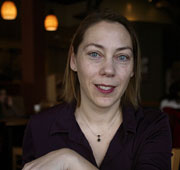
Susan Gillis
Photo by Andrew
Dobrowolskyj
|
Kitchen Floor
(From Volta, by Susan Gillis)
These past six days have been equatorial,
transplendent.
We eat outside. Tonight it seemed the sun
bugled across the sky, draping Crow Hill
and the Blomidons in satin, rimming the inlets and
coves
of Humber Arm with brass and scarlet, gold
at the day’s last call and the sly falling in
of the humdrum. Creatures slide away to their night
hideouts and watchtowers; we come in reluctantly
dragging plates and cutlery and leftover potatoes,
to the fridge grinding on, and on the floor a dark
shock where a wind has come in and blown over
the vase of peonies, the wet petals wine-dark
in the gloam before you turn on the light; weather
gathering over the hills where we’d hoped for stars.
An excerpt from Postcards from London
by Scott McRae
A volta is the eighth line of a sonnet where the turn of thought occurs.
For Concordia graduate Susan Gillis, a volta occurred in 1995. She sold
her share in a successful vintage-clothing business and chose to pursue
poetry.
It was a big decision. Business had been booming and her work had taken
her around the world. “I made a down payment for a house from the
sales of Hawaiian shirts,” she says. However, she explains that she
no longer felt joy in her job. What had started out as a creative venture
had become an obsession with practicality and profit. “It was draining
my creativity.”
Gillis, who has written ever since she can remember and still has the
childhood stories of fairies and elves to prove it, decided to get serious
about her writing. She moved from Victoria to Montreal, enrolled in the
master’s program in English and Creative Writing at Concordia, and
published her first book of poems, Swimming Among the Ruins, in
2000. It made the shortlist for several literary awards.
Following this success, she wrote a second book of poems entitled Volta.
The poems originate in a class exercise for English professor Eve Sanders,
to translate any 16th-century text into modern English. As she searched
for a work, Gillis came across a sonnet by Henry Howard, the Earl of Surrey.
“It bothered me,” she said. “I didn’t like it much.
I didn’t think it was saying much.” In fact, she found the surface
of his poem to be so smooth and devoid of general feeling that she wondered
why we still read him, but the more she examined his sonnet, the more
she discovered what lay within it.
“I used the translation exercise as a microscope.” This, in
turn, prompted a phenomenal outburst of creativity. She took each of Surrey’s
15 sonnets and translated them into free verse and modern language. Other
poems would jump to the page as she laboured over the translation. Her
first book had taken 10 years to write; the bulk of Volta took
only two months.
Although many have described her poetry as sensuous, Gillis explains that
her poems always begin as questions. It is only in the process of gathering
together the nebulous threads of her thought that she recreates her questions
in concrete form.
“I’m exploring the limits of how we know through the senses,”
she said. She is also exploring how we come to know things in the first
place.
While undertaking her translation project, Gillis discovered that delving
into old works forces the reader to accept a different conception of the
world. The disjunction between our reality and the author’s reality
prompts us to evaluate the extent to which our actions, rituals and beliefs
are defined by the time in which we live.
Expressing such complex ideas is no easy task. According to Gillis, poetry
is the best medium for such philosophical inquiry. “Without constructs
of form, those ideas can get amorphous and difficult to control.”
The constraints of poetry, whether they be the formalized structure of
the sonnet or the internal rules of free verse, create an ideal container.
She added candidly, “I don’t feel competent in any other kind
of writing. I haven’t found a voice or a form in any other type of
writing.” The voice she has found in her poetry, though, is clear
and distinct.
Volta and Swimming Among the Ruins, both by Susan Gillis, are published
by Signature Press (each, $12.95, paperback, 96 pp).
From Swimming Among the Ruins by Susan Gillis
Your silence would not survive the current that is
this
passage, spices frying, bells, work crews knocking at
brick.
Dust, and the greasy residue of morning’s market trek
under the bridge.
There are eyes in the street that avert like yours,
down
lane, into chinks in brick. Others are bold - What am I
doing here?
Sir. I am doing
exactly as you: I eat, I work at my trade, I long.
Excerpt from slip
(from Resume Drowning by Jon Paul Fiorentino)
i had to become an academic
[i don’t like people, only words or dreams]
so dream you sickly academic
implode some codes or simply implode
because there are too many of you
asserting your worth
and slipping
poor slip
invoking dormant diction
claiming truth in fiction
dream or sedate yourself permanently
you might be missed
but only in theory
|
|
|



